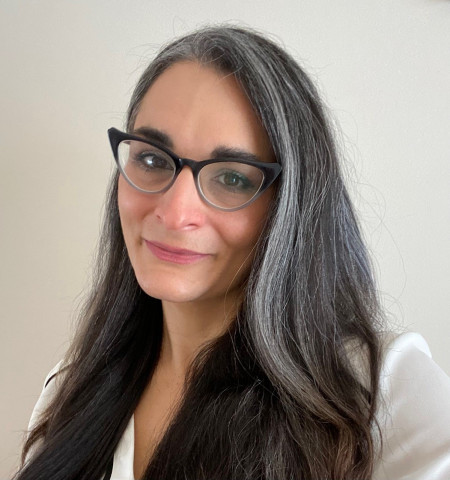
Dr Precious Chatterje-Doody
Senior Lecturer In Politics And International Studies
Biography
Professional biography
Dr Precious Chatterje-Doody joined the OU in 2019 as a Lecturer in Politics and International Studies. She taught previously at the Universities of Manchester and Birmingham, and worked for two years as a Research Associate on the AHRC-funded project Reframing Russia for the Global Mediasphere: from Cold War to 'Information War'?
She is co-lead of the Open Societal Challenge project, Democracy, Disinformation and Religion within which she has co-curated various iterations of the Art for a Better World academic-art collaborative exhibition.
Research interests
Dr Chatterje-Doody's research interests centre on questions of communication, perception and security, with a particular focus on Russia. Her work engages with the role of historical memory and identity in international relations; soft power, political communication and global media (particularly Russia's international broadcaster, RT), and the relationship between religion and disinformation; and critical approaches to security, including emotions and war.
She is a former co-convener of the British International Studies working group on East European and Eurasian Security. She is the co-author (with Hutchings,Tolz, Crilley and Gillespie) of "Russia, Disinformation and the Liberal Order: RT as a Populist Pariah" (Cornell University Press, 2024). Her previous book (with Dr Ilya Yablokov, Sheffield University) was "Russia Today and Conspiracy Theory: People, power and politics on RT" (Routledge, 2022). Her forthcoming book is "The Russian identity riddle: unwrapping Russia’s security policy" (Routledge, 2026).
Teaching interests
- Module Team Co-Chair (production), D322: International Relations: People, Power and Change
- Module Team Member (prodution), D228: Exploring International Relations
- Module Team Member and former Chair (presentation), DD 313: International relations: continuity and change in global politics
- Module Team Member (production), D818 and D828, MA International Relations
- Narrative approaches to international relations
- Qualitative social media methods
PhD Supervision
Dr Chatterje-Doody is happy to supervise candidates working on Russian foreign/security policy; soft power and international broadcasting; narrative approaches to international relations; emotions/affect and international politics; elite rhetoric, populism and global media; media and memory.
- Current PhD supervision
- Paul Beel - "Great Powers, Wars of Choice and Realism: An analysis of the United States' struggle to end intervention".
- Joe Ruffell - "A Telos of Isolation? Organisation, ideology, and history in communist Albania"
- Past PhD Supervision
- Emma Connolly - "I can't remember the last time I kissed you: exploring commemorative behavior in the instantaneous aftermath of terror attacks" (2025)
Impact and engagement
Five disinformation tactics Russia is using to try to influence the Russian election, The Conversation, September, 2024
Open secrets of a rigged Russian election, OU News, March 2024
Putin's four-hour Q and A is a valuable insight into the Russian President's version of reality, The Conversation, December 2023
Putin demands 'real men' fight his war with mass email call-up papers, The Express, April 2023
Ukraine war: how have Vladimir Putin’s narratives survived a year of reality checks?, The Conversation, February 2023
Evidence: Misinformation and Trusted voices, DCMS, September 2022
Ukraine war: Putin announces annexation of four regions, but his hold on them may be flimsy, The Conversation, September 2022
RT and Conspiracy Theories: “The Kremlin’s Underdog” against the West, The Centre for Democratic Integrity, Dr Precious Chatterje-Doody and Dr Ilya Yablokov, September 2022
Putin is clearly worried - Russia's media is becoming as censored as China's - COMMENT , The Express, March 2022
Ukraine war: RT coverage is biased and misleading but banning the network may not be a good idea, The Conversation, Dr Precious Chatterje-Doody March 2022.
Russia’s state broadcaster RT going all-out to boost legitimacy of rigged Duma election, The Conversation, Dr Precious Chatterje-Doody and Dr Ilya Yablokov, September 2021.
The Evolution of Russian Hybrid Warfare - United Kingdom, CEPA, January 2021
The RT Challenge: How to respond to Russia’s international broadcaster, Policy@Manchester briefing note, Professor Stephen Hutchings, Professor Vera Tolz and Dr Precious Chatterje-Doody, July 2019.
Did Russia make Brexit promoter Nigel Farage a ‘YouTube star’? Dr Rhys Crilley and Dr Precious N Chatterje-Doody, Washington Post Monkey Cage, 27 March, 2019.
‘Ofcom’s latest ruling on RT is more significant than you might think’. Professor Stephen Hutchings, Dr Precious Chatterje-Doody and Dr Rhys Crilley, The Huffington Post, 21 December 2018.
‘How RT (Russia Today) navigates ‘Us’ and ‘Them’’, Dr Precious Chatterje-Doody, E-IR, 3 October 2018.
‘How badly did Russia’s interview with the Skripal poisoning suspects backfire?’, Dr Precious Chatterje-Doody and Dr Rhys Crilley, Washington Post Monkey Cage blog, 15 September 2018.
‘Four things you need to know about Russian media manipulation strategies’, Professor Vera Tolz and Dr Precious Chatterje-Doody, The Conversation, 5 April 2018.
‘Why did Putin build a monument to victims of Soviet repression?’, Professor Vera Tolz and Dr Precious Chatterje-Doody, Washington Post Monkey Cage, November 2017. (reprinted by Newsweek).
‘Post-truth’ media really is shifting the news agenda – and more subtly than it seems…’ Dr Precious Chatterje-Doody, The Conversation, September 2017.
External collaborations
(Mis-)translating Deceit (AHRC)
Reframing Russia for the global Mediasphere: from Cold War to 'information war' (AHRC)
Publications
Book
Russia, Disinformation, and the Liberal Order: RT as Populist Pariah (2024)
Russia Today and Conspiracy Theories: People, Power and Politics on RT (2022)
Book Chapter
Russian Public Diplomacy: Questioning Certainties in Uncertain Times (2021)
Government disinformation in war and conflict (2021)
Competition for co-operation: Roles and Realities in Russian Foreign Policy (2015)
Russia rising? The normative renaissance of multinational organizations (2015)
Journal Article
ICYMI: RT and Youth-Oriented International Broadcasting as (Geo)Political Culture Jamming (2022)
Mediatization and journalistic agency: Russian television coverage of the Skripal poisonings (2021)
The Stories we Tell: Memory, Engagement(s), and Donbas a Video Essay (2021)
From Russia with Lols: Humour, RT, and the Legitimation of Russian Foreign Policy (2021)
Security studies in the age of ‘post-truth’ politics: in defence of poststructuralism (2019)
Harnessing History: Narratives, Identity and Perceptions of Russia's Post-Soviet Role (2014)